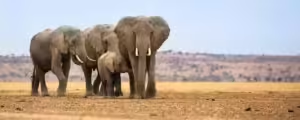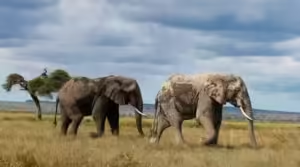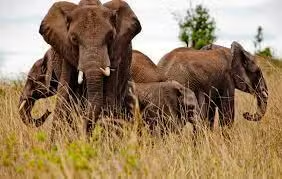An adult elephant aged 35 was killed while traversing from Kenya’s Amboseli National Park to Northern Tanzania. The creature has just entered to his reproductive era and belonged to a unique population of elephants.
The innocent belonged to the family of Super-tusker elephants, which at least have one tusk that weighs more than 50kg. Poachers decimated the species in the past, leaving only 100 of the species now.
Program Director at the Amboseli Trust for Elephants, Cynthia Moss, said that the unnatural death of any elephant is very troublesome. Moss, who has been studying this population for 51 years, stated that what they are trying to do as scientists is study as natural a population as possible. So, to kill an elephant just because it has big tusks is totally against everything they have strived for.
Reportedly, Kenya has banned hunting in 1977 but it is still legal in Tanzania, where hunting companies can obtain licenses on behalf of a client. For shooting an elephant people need to get permitted for which it costs between US $10,000 to $20,000.

For the last three decades, the Kenyan-Tanzanian border had been relatively safe for elephants until Gilgil was shot dead and his carcass was burned.
Later, in November, another elephant was killed in Tanzania which followed another killing last month.
According to a report at the time, Kenya and Tanzania both have agreed to enact a temporary ban at the border, until they decided how to best manage the hunting.
The former head of Kenya Wildlife Service, David Western, reminded that the understanding between both nations would be firm and endured the agreement that elephants would not be hunted on the Tanzanian side. He further added that otherwise, the hunting would have started much sooner.

Governor of Kajiado County in Kenya – Joseph Ole Lenku, the custodian of Amboseli National Park called on his counterparts on the Tanzanian side to carefully consider the long-term implications of such actions to further join us in preserving the shared natural heritage for future generations.
More than 50 organizations have petitioned Tanzanian President Samia Suluhu to order an immediate ban on elephant trophy hunting. The United States has also just announced that it would ban African elephant hunting trophy imports.
In recent years, the industries in Tanzania have boomed by generating millions of dollars annually for the country and have brought in hunters from across the world, especially from the United States.

The Tanzania Wildlife Management Authority, the Office of the Tanzanian President, and the Kenya Wildlife Service have not responded to the requests yet.
Notably, the first and third hunts of the Amboseli elephants were conducted by Kilombero North Safaris.
As per the public documents, the Tanzanian company has bought two concessions in the year 2022 and awarded for a ten-year period, for $250,000.
The managers of Kilombero – Zidane Janbeck and Quintin Whitehead, said that they had legally conducted the safaris, considering the strict Tanzanian Law, in a community wildlife area allocated to the company.

